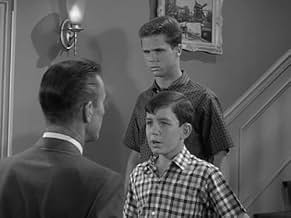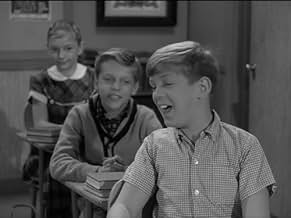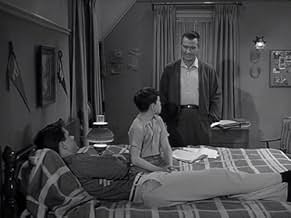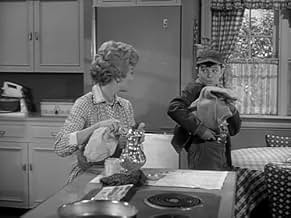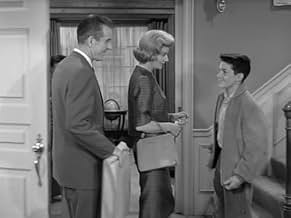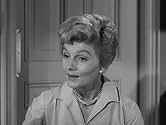Ajouter une intrigue dans votre langueThe misadventures of a suburban boy, family and friends.The misadventures of a suburban boy, family and friends.The misadventures of a suburban boy, family and friends.
- Nommé pour 2 Primetime Emmys
- 5 victoires et 4 nominations au total
Parcourir les épisodes
Avis à la une
It is easy to criticize "Leave it to Beaver" today for being an overly romanticized look at family life in the late 50s/early 60s. Because, well, it is an overly romanticized look at family in the late 50s/early 60s. But so what? This is a well written, well acted sitcom. I love it for the show that it is and I don't worry about the more realistic show it could have been.
Ward and June Cleaver are raising two sons: Wally and Theodore, who everyone calls by the nickname "Beaver." (To answer an earlier reviewer, the nickname came from older brother Wally who couldn't pronounce "Theodore" when his little brother was born, instead pronouncing it "Beaver.)
Beaver is definitely not a Bart Simpson, constantly making trouble and outwitting his dad. No, Beaver is a kid who gets into trouble usually because one of his friends (Larry, Richard or Gilbert) talks him into it. It is then usually up to Ward to help straighten the situation out and gently but firmly teach Beaver the lesson to be learned.
Wally and June are equally as important. Wally is the older brother we all wish we had. And who else but June could look so perfect while fixing up a batch of our favorite cookies?
One of the biggest reasons why the show was popular then and is still popular today, however, is the supporting cast. Eddie Haskell. ("And might I add Mrs. Cleaver, that is a lovely blouse you are wearing.") Fred Rutherford. ("See you in the salt mines, Ward.") Larry Mondello. Miss Landers. Mary Ellen Rogers. Gus the Fireman. All have endured for more than 40 years and become permanent fixtures in our pop culture.
Overly romanticized? Sure. But so what. Years from now when people have forgotten almost all of the sitcoms airing today, The Beaver will still be bringing smiles to our faces.
Ward and June Cleaver are raising two sons: Wally and Theodore, who everyone calls by the nickname "Beaver." (To answer an earlier reviewer, the nickname came from older brother Wally who couldn't pronounce "Theodore" when his little brother was born, instead pronouncing it "Beaver.)
Beaver is definitely not a Bart Simpson, constantly making trouble and outwitting his dad. No, Beaver is a kid who gets into trouble usually because one of his friends (Larry, Richard or Gilbert) talks him into it. It is then usually up to Ward to help straighten the situation out and gently but firmly teach Beaver the lesson to be learned.
Wally and June are equally as important. Wally is the older brother we all wish we had. And who else but June could look so perfect while fixing up a batch of our favorite cookies?
One of the biggest reasons why the show was popular then and is still popular today, however, is the supporting cast. Eddie Haskell. ("And might I add Mrs. Cleaver, that is a lovely blouse you are wearing.") Fred Rutherford. ("See you in the salt mines, Ward.") Larry Mondello. Miss Landers. Mary Ellen Rogers. Gus the Fireman. All have endured for more than 40 years and become permanent fixtures in our pop culture.
Overly romanticized? Sure. But so what. Years from now when people have forgotten almost all of the sitcoms airing today, The Beaver will still be bringing smiles to our faces.
Others have commented that "Leave It To Beaver" was not a true reflection of American life. Maybe they were not there. I was. When the series opened in 1957, I was seven years old, an exact contemporary of the Beaver character. I loved the show from the first episode. I used it as a forecaster of what I could expect to happen to me in the coming week. While I had no older brother, my other experiences were quite similar. There were in my class at school a "Larry Mundello", a "Judy Hensler", and many other characters who led me into mischief, then scattered, leaving me holding the bag. I remember the baby alligator ads in comic books, publishing a neighborhood newspaper (one issue), and getting caught climbing things I shouldn't have. My father went to the office, my mother tended to the housekeeping. Maybe my life wasn't typical, but it sure was real to me, and I relive it every evening with reruns of "Leave It To Beaver."
"Leave It to Beaver" (1957-1963) is a family show set in the suburban town of Mayfield that focuses on the Cleaver family: Ward (Hugh Beaumont), father and accountant; June (Barbara Billingsley), wife and stay-at-home Mom; and their two boys, Wally (Tony Dow) a teenager, and their youngest, Theodore, better known to everyone as "Beaver" (Jerry Mathers). While television of the 1950s and '60s had its share of family shows during its black and white age, including "Father Knows Best" with Robert Young and Jane Wyatt; "The Donna Reed Show" (with Donna Reed and Carl Betz); "Dennis the Menace" (starring Jay North); and later, the long running series, "My Three Sons" (1960-1972) with Fred MacMurray, it seemed unlikely that "Leave It to Beaver" would become the one sit-com to survive and continue to air on television, whether locally or on cable, decades after its concluding episode in 1963. The aforementioned family comedy shows had its share of reruns before slowly disappearing to Limbo, replaced by newer programs to its Color- oriented viewers, but this innocent black and white show which was done on film and not on video tape and to date never colorized to attract younger viewers, still entertains as is. "Leave It to Beaver" geared to its younger viewers when first aired, but today, the children who loved it back then are either adults or grandparents currently sharing their TV memories with their young ones. And the tradition continues.
Like most long-running shows, this one lasting six seasons, the earlier episodes are the best, mixing comedy, charm and well scripted dialog. It's obvious that the writer or writers who developed this program had fond memories of what it's like being a child, for that many of the show's characters, mainly children, could easily be identified by someone we at one time had know in our youth, one character in particular being Judy Henson, the school's pony tailed tattle-tale, teacher's pet and know-it-all. Beaver's closest friend during the first couple of seasons was the chubby Larry Mondello, while Wally's pals were Chester, Tooey and the conniving Eddie Haskell. Over the years, characters have come and gone, but the writers managed to find new friends for Beaver while they kept and expanded the Eddie Haskell character, played to perfection by Ken Osmond, one of the most memorable and "smooth" characters created and developed. Along the way, Chester and Tooey were just phased out, and a new character, Clarence "Lumpy" Rutherford (Frank Bank) stepped in. At first, Lumpy was the neighborhood bully who hounded Wally and the Beav, to eventually became one of Wally's closest friends.
With each passing season viewers got to see the show's new opening, watching the boys growing and maturing to young adults by season six. During the final season, the instrumental theme song remained the same, though jazzed for its final season (1962- 63). By then, Beaver, the central titled character has turned 14, losing his innocent and boyish charm and becoming least interesting character. With the writers sensing this, the scripts placed Beaver in support in several episodes while stories revolved around more on Wally and his friends. There were even segments in which either Lumpy or Eddie would have almost an entire episode, but when Beaver became the central character, it lacked something, becoming mediocre episodes. By mid season, Beaver would start becoming more interested in girls. After 235 episodes, the Cleaver family went into retirement.
The amazing aspect about this program is the development of its characters, not only the central ones but the supporting crew. Aside from Ken Osmond's ever so polite Eddie, who's well mannered in front of the adults and a "big mouth, wise guy" to his pals, there's Richard Deacon as Fred Rutherford, Lumpy's father; the charming Sue Randall as Miss Landers, Beaver's teacher; Burt Mustin as Gus, the fireman; Beaver's other friends including Stanley Fafara as Whitey Whitney, who appeared occasionally through the show's six seasons; Stephen Talbot as Gilbert, and Richard Correll as Richard Rickover. The show might have its share of contradiction, there was a Violet Rutherford, Fred's daughter/ Lumpy's sister, who disappeared, leaving Lumpy the Rutherfordf's only "offspring," while Gilbert Bates introduced as the only child of his widowed father, to suddenly have a mother and sister in later episodes who never appear.
Aside this being a comedy show, "Leave It to Beaver" does take time out for some tender moments. In almost every episode, after either Wally or the Beav, or both, get tangled up with problems, whether it be their fault or not, there is usually a good father to son(s) lecture, along with the moral lesson to what's occurred. One in particular line recited by Ward (Hugh Beaumont) to his wife, June, that stands out is, "The way to get your children's love is to first earn their respect." Occasionally mother June would have her moment of truth with her boys as well, giving them the lesson, value and facts of life, something currently missing in today's TV family sitcoms. And even when the parents are in the wrong, this is one of those rare cases in which the TV Dad or Mom will come out and admit it, showing its viewers that even the parents aren't perfect, but they do what's best for their children as well as learning from their own mistakes.
There are many classic episodes, the one hailed the best where Beaver gets trapped in a billboard soup bowl. Regardless of its age, "Leave It to Beaver" is harmless fun, good family viewing. There was even a 1983 reunion show, "Still the Beaver," along with a new up-to-date series, "The New Leave It to Beaver" (1985-1989). While it's good seeing those familiar faces again, a little older and slightly wiser, but minus the deceased Hugh Beaumont, who is sorely missed, nothing comes close to this original series.
Like most long-running shows, this one lasting six seasons, the earlier episodes are the best, mixing comedy, charm and well scripted dialog. It's obvious that the writer or writers who developed this program had fond memories of what it's like being a child, for that many of the show's characters, mainly children, could easily be identified by someone we at one time had know in our youth, one character in particular being Judy Henson, the school's pony tailed tattle-tale, teacher's pet and know-it-all. Beaver's closest friend during the first couple of seasons was the chubby Larry Mondello, while Wally's pals were Chester, Tooey and the conniving Eddie Haskell. Over the years, characters have come and gone, but the writers managed to find new friends for Beaver while they kept and expanded the Eddie Haskell character, played to perfection by Ken Osmond, one of the most memorable and "smooth" characters created and developed. Along the way, Chester and Tooey were just phased out, and a new character, Clarence "Lumpy" Rutherford (Frank Bank) stepped in. At first, Lumpy was the neighborhood bully who hounded Wally and the Beav, to eventually became one of Wally's closest friends.
With each passing season viewers got to see the show's new opening, watching the boys growing and maturing to young adults by season six. During the final season, the instrumental theme song remained the same, though jazzed for its final season (1962- 63). By then, Beaver, the central titled character has turned 14, losing his innocent and boyish charm and becoming least interesting character. With the writers sensing this, the scripts placed Beaver in support in several episodes while stories revolved around more on Wally and his friends. There were even segments in which either Lumpy or Eddie would have almost an entire episode, but when Beaver became the central character, it lacked something, becoming mediocre episodes. By mid season, Beaver would start becoming more interested in girls. After 235 episodes, the Cleaver family went into retirement.
The amazing aspect about this program is the development of its characters, not only the central ones but the supporting crew. Aside from Ken Osmond's ever so polite Eddie, who's well mannered in front of the adults and a "big mouth, wise guy" to his pals, there's Richard Deacon as Fred Rutherford, Lumpy's father; the charming Sue Randall as Miss Landers, Beaver's teacher; Burt Mustin as Gus, the fireman; Beaver's other friends including Stanley Fafara as Whitey Whitney, who appeared occasionally through the show's six seasons; Stephen Talbot as Gilbert, and Richard Correll as Richard Rickover. The show might have its share of contradiction, there was a Violet Rutherford, Fred's daughter/ Lumpy's sister, who disappeared, leaving Lumpy the Rutherfordf's only "offspring," while Gilbert Bates introduced as the only child of his widowed father, to suddenly have a mother and sister in later episodes who never appear.
Aside this being a comedy show, "Leave It to Beaver" does take time out for some tender moments. In almost every episode, after either Wally or the Beav, or both, get tangled up with problems, whether it be their fault or not, there is usually a good father to son(s) lecture, along with the moral lesson to what's occurred. One in particular line recited by Ward (Hugh Beaumont) to his wife, June, that stands out is, "The way to get your children's love is to first earn their respect." Occasionally mother June would have her moment of truth with her boys as well, giving them the lesson, value and facts of life, something currently missing in today's TV family sitcoms. And even when the parents are in the wrong, this is one of those rare cases in which the TV Dad or Mom will come out and admit it, showing its viewers that even the parents aren't perfect, but they do what's best for their children as well as learning from their own mistakes.
There are many classic episodes, the one hailed the best where Beaver gets trapped in a billboard soup bowl. Regardless of its age, "Leave It to Beaver" is harmless fun, good family viewing. There was even a 1983 reunion show, "Still the Beaver," along with a new up-to-date series, "The New Leave It to Beaver" (1985-1989). While it's good seeing those familiar faces again, a little older and slightly wiser, but minus the deceased Hugh Beaumont, who is sorely missed, nothing comes close to this original series.
During a recent TVLand "Top 10 Characters You Love To Hate" special, a well-known (under 40) female actress was quoted as saying that she believed sneaky Eddie Haskell to be the only character in the show that she remembered for resembling "a real person".
Though I'll agree that Ward and June might come across at times as being unrealistically conservative (for example, their sitting at home in their Sunday best for no reason) her comment was something I found hard to understand, since, Beaver was known to be the first show of it's kind to explore such teen issues as, alcoholism, divorce, and troubled teens.
It seems that many viewers also do not understand the significance of Ward's frequent reference (often shown as his sad remembrance) to his own harsh encounters with his strict Father, who made a point of "taking him out to the woodshed" to let Ward know "just what his Father meant", and how Ward, as a Father himself, deciding that he would not do the same when teaching his own sons right from wrong.
While the conservative side of the show might be a bit too much for some, in the end there is nothing wrong with that behavior either - it's a far better lifestyle than what we see in today's world, where parents sometimes see their children as a liability rather than a blessing.
Those who regularly watch Beaver know that while the corn does sometimes grow high in Mayfield, the trueness of the show's stories is what makes Beaver the timeless show that many still enjoy almost a half century after it's debut.
Though I'll agree that Ward and June might come across at times as being unrealistically conservative (for example, their sitting at home in their Sunday best for no reason) her comment was something I found hard to understand, since, Beaver was known to be the first show of it's kind to explore such teen issues as, alcoholism, divorce, and troubled teens.
It seems that many viewers also do not understand the significance of Ward's frequent reference (often shown as his sad remembrance) to his own harsh encounters with his strict Father, who made a point of "taking him out to the woodshed" to let Ward know "just what his Father meant", and how Ward, as a Father himself, deciding that he would not do the same when teaching his own sons right from wrong.
While the conservative side of the show might be a bit too much for some, in the end there is nothing wrong with that behavior either - it's a far better lifestyle than what we see in today's world, where parents sometimes see their children as a liability rather than a blessing.
Those who regularly watch Beaver know that while the corn does sometimes grow high in Mayfield, the trueness of the show's stories is what makes Beaver the timeless show that many still enjoy almost a half century after it's debut.
When I was young, way back in the 1960's I never really dug this show. It was too 'predictable'. In the first five minutes we meet the Cleavers, then in the next 15, Beaver has screwed up, and the last few minutes of the show, we get a good lesson on 'cause and effect' from Ward. Everybody laughs, credits roll, and we get to see Wally and Beaver walking home and a brand new De Soto go by in the street (Chrysler, replacing Ford Motor Company, sponsored the show from about 1959, onward and used the closing credits to get a product placement shot in.) And as I was a kid at the time, I never enjoyed seeing other kids get into trouble.
Now that I'm in my forties, I find the show hysterical. The exasperated look that Ward and June get when something happens, Wally's comments, and the dealings with all the Cleavers friends are priceless.
Wally's come backs of 'Aw, heck, Beaver', and 'Don't be a creep, or something.' Crack me up. You can always count on a great line from Tony Dow in every episode.
The story lines were fairly typical fifties fluff, with a few exceptions. There is one that deals with an alcoholic handyman that Ward knows, that frankly could be re-shot today, and not feel 40 plus years old. I recently saw one, where Beaver joins a record club, and forgets to send back a card to cancel the next shipment of records. Hands up, out there, how many of us do that today with our CD and DVD club selection cards?
A true, kindhearted, and well written classic to be enjoyed by the whole family.
Now that I'm in my forties, I find the show hysterical. The exasperated look that Ward and June get when something happens, Wally's comments, and the dealings with all the Cleavers friends are priceless.
Wally's come backs of 'Aw, heck, Beaver', and 'Don't be a creep, or something.' Crack me up. You can always count on a great line from Tony Dow in every episode.
The story lines were fairly typical fifties fluff, with a few exceptions. There is one that deals with an alcoholic handyman that Ward knows, that frankly could be re-shot today, and not feel 40 plus years old. I recently saw one, where Beaver joins a record club, and forgets to send back a card to cancel the next shipment of records. Hands up, out there, how many of us do that today with our CD and DVD club selection cards?
A true, kindhearted, and well written classic to be enjoyed by the whole family.
Le saviez-vous
- AnecdotesAlthough the series was still earning good ratings, its star, Jerry Mathers, wanted to retire from acting to focus on his education upon entering high school. As a result, it was agreed to halt production and the series became the first prime time American production to have a series finale.
- GaffesDuring season one, Wally was in 8th grade and Beaver was in 2nd - six years apart. By the end season six Beaver was finishing 8th grade and Wally was graduating high school - 4 years apart.
- Citations
June Cleaver: Wally, where are you going?
Wally Cleaver: I'm going over to slug Eddie.
June Cleaver: That's no way to talk, this is Sunday.
Wally Cleaver: You're right, I'll wait 'til tomorrow and slug him in the cafeteria.
- Crédits fousThe actor who plays "Beaver" is always credited at the beginning of the show as "And Jerry Mathers...as The Beaver".
- ConnexionsFeatured in Prime Times (1983)
Meilleurs choix
Connectez-vous pour évaluer et suivre la liste de favoris afin de recevoir des recommandations personnalisées
Détails
- Date de sortie
- Pays d’origine
- Site officiel
- Langue
- Aussi connu sous le nom de
- It's a Small World
- Lieux de tournage
- Sociétés de production
- Voir plus de crédits d'entreprise sur IMDbPro
- Durée30 minutes
- Couleur
- Mixage
- Rapport de forme
- 4:3
Contribuer à cette page
Suggérer une modification ou ajouter du contenu manquant





